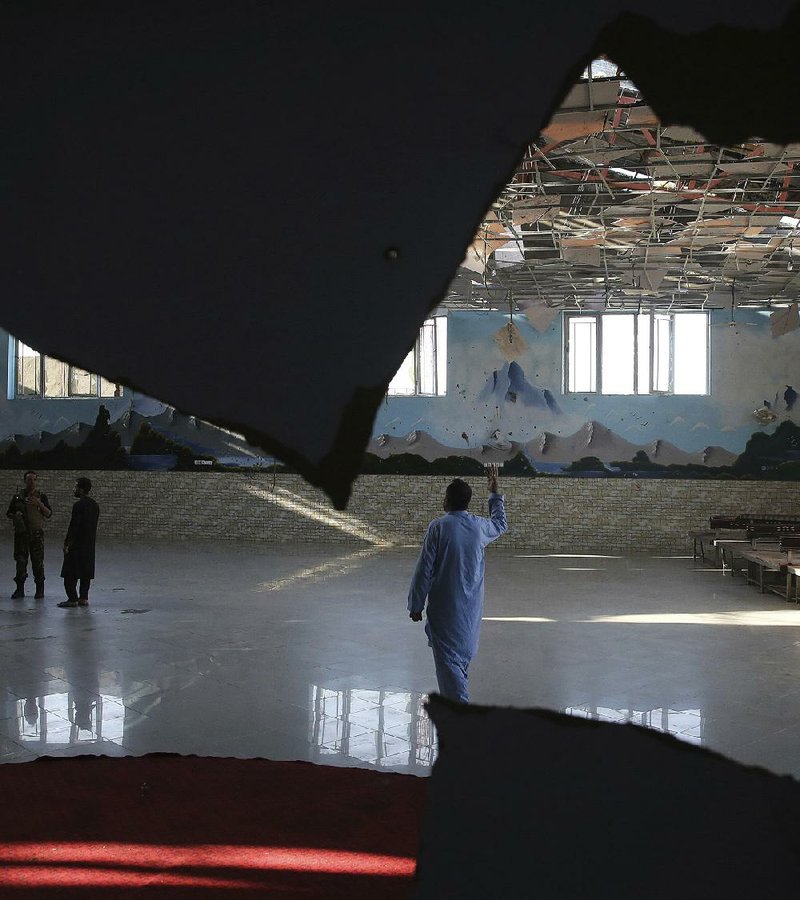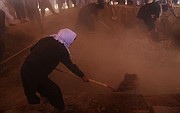KABUL, Afghanistan -- An affiliate of the Islamic State extremist group claimed responsibility Sunday for the deadliest attack in Afghanistan's capital this year, as the government reported that 63 people were killed and 182 were wounded.
In a statement posted online, the extremist Sunni militia described the suicide bomber as a Pakistani who had attacked a Saturday gathering of "rejecter polytheists," as the group describes followers of Shiite Islam.
The gathering was a wedding, held in an event hall to which more than 1,200 people had been invited. The event hall's owner, Hussain Ali, said the crowd was in fact a mix of Shiites and Sunnis.
The bomber detonated his explosives near the stage where musicians were playing and "all the youths, children and all the people who were there were killed," said Gul Mohammad, a witness.
Many of the dead and wounded were members of the same families. The bride and groom, both Shiites, survived the blast, but each lost family members, including 14 on the bride's side. The groom, a tailor in his 20s named Mirwais Elmi, told Kabul's ToloNews TV that his family was in shock and would never recover.
"My bride keeps fainting. I lost my brother, my friends, my relatives," Elmi said. "I never thought such a thing would happen at my wedding. I will never see happiness in my life again."
[Video not showing up above? Click here to watch » https://www.youtube.com/watch?v=166Cs6K1thM]
Stunned families buried the dead, some digging with their bare hands. One wounded survivor, Mohammad Aslim, still wore his bloodied clothes the day after late Saturday's blast. He and his friends had already buried 16 bodies, among them several close relatives, including a 7-year-old boy.
Aslim looked exhausted, and said he was waiting to bury more. Nearby, a man named Amanullah, who lost his 14-year-old son, said in anguish that the explosion had mangled the boy's face so badly he could no longer recognize it.
"I wish I could find the pieces of my son's body and put them as one piece into the grave," he cried.
At a funeral in a parched cemetery in western Kabul, Hussain Dad, 70, watched while two young men, both friends of the groom, were buried in wooden coffins. A Muslim cleric bent over the graves and recited prayers in Arabic. Unmarked stones were placed at the head of each grave.
The victims were members of the ethnic Hazara and Shiite minority, which predominates in western Kabul.
"They were innocent young men," Dad said. "They had not harmed a single fly."
The few mourners disbanded quickly afterward, worried about further violence.
"The Taliban and Daesh are two sides of the same coin," Dad said, using the Arabic acronym for the Islamic State. "They used to attack mosques, and now they have started with wedding halls."
TALIBAN CONDEMNATION
The Taliban called Saturday's attack "forbidden and unjustifiable." A spokesman for the Taliban insurgents, Sohail Shaheen, called it a "brutal act" and said the group "condemns it in the strongest terms."
But Afghan President Ashraf Ghani still blamed the Taliban in part. In a tweet offering condolences for the victims of the "barbaric" attack, he said the "Taliban cannot absolve themselves of blame, for they provide platform for terrorists."
The Taliban, an Afghan militia with extremist Sunni beliefs, took over much of Afghanistan in 1996, and they ruled until the U.S.-led invasion in 2001. The group often attacks military and government targets.
The Islamic State, an international Sunni terrorist group, is notorious for attacks on civilians. It views Shiites as apostates. Its local affiliate, the Islamic State in Khorasan, has claimed numerous attacks in Kabul, many of them in the city's western, Shiite-dominated districts.
The emergence of the Islamic State affiliate in recent years might be the greatest threat to Afghan civilians as the U.S. and Taliban seek an agreement to end nearly 18 years of fighting. While the U.S. wants Taliban assurances that Afghanistan will no longer be used as a launchpad for global terror attacks, there appear to be no guarantees of protection for Afghan civilians.
The U.S. envoy in the talks, Zalmay Khalilzad, said Sunday on Twitter that the peace process needs to be accelerated, including holding talks involving the Taliban, the Afghan government and other Afghans. He said that will put Afghanistan in a "much stronger position" to defeat the Islamic State affiliate.
The Taliban have said they expect to reach a deal soon that would achieve one of their key goals: The removal of most U.S. troops from the country.
Speaking to reporters Sunday about the U.S. forces in Afghanistan, President Donald Trump said: "We're talking to Afghanistan. Both the government and we're also talking to the Taliban, having very good discussions. We'll see what happens. We've really got it down to probably 13,000 people, and we'll be bringing it down a little bit more. And then we'll decide whether or not we'll be staying longer or not. We're having very good discussions with the Taliban. We're having very good discussions with the Afghan government."
The explosion came just ahead of Afghanistan's 100th Independence Day today, celebrating the nation's independence from the United Kingdom in 1919. The city, long familiar with checkpoints and razor wire, has been under heavier security. A planned event in Kabul marking the anniversary was postponed because of the attack, the president's office said.
The bombing was one of the deadliest ever in the Afghan capital, which has suffered scores of terrorist attacks in the past decade. It comes less than two weeks after a car bombing near a police facility just a few blocks from the Dubai City wedding hall. That Aug. 7 attack killed at least 14 people and wounded 145.
Information for this article was contributed by Rahim Faiez, Cara Anna and Maamoun Youssef of The Associated Press; and by Pamela Constable, Sharif Hassan and Sayed Salahuddin of The Washington Post.
A Section on 08/19/2019

